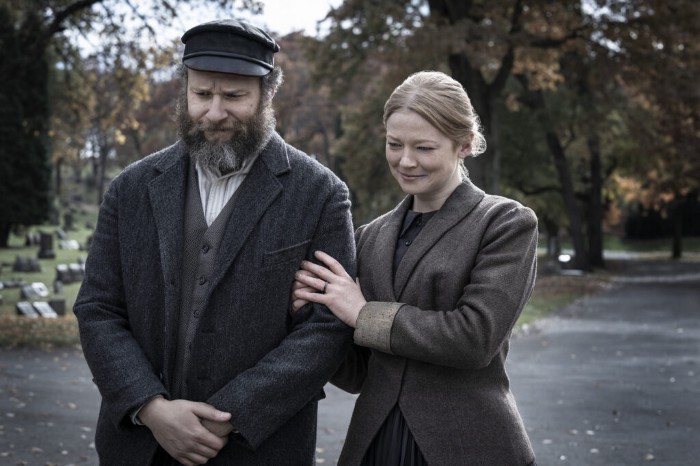Laggies: Lynn Shelton’s Film Blends a Coming-of-Age Story With a Quarter-Life Crisis
Laggies is a fantastic movie, filled with down-to-earth characters, transcendent themes, and witty comedy


Normally, I would say that double the Seth Rogen must mean double the fun, but that’s not necessarily the case with the new HBO Max film, An American Pickle.
Rogen plays Herschel Greenbaum, a Jewish immigrant who travels to America in 1919 in order to make a name for himself. However, on one fateful day, while working in a pickle factory, he falls into a vat of pickle juice which perfectly preserves him for a hundred years. Waking up in the modern day, he is united with his great-grandson, Ben (also Rogen).
While the plot is absurd, I was really on board with this premise. I thought it was just wacky enough to invite some great out-there comedy. I am also a really big fan of Seth Rogen. Regardless of what he is in, I am always excited and eager to watch. However, that may have been my downfall with An American Pickle.
The pieces are certainly there for a really great comedy, but it all comes down to the writing. Simon Rich’s (SNL, Man Seeking Woman) screenplay is simply not up to snuff. Containing underdeveloped characters, logic-lacking plot points, and an over-adherence to formula, An American Pickle’s promise dissipates within the first fifteen minutes. While it regains some momentum in the second half of the film, An American Pickle ultimately offers up nothing more than what we have already seen.

An American Pickle follows the perspective of Herschel. The beginning of the film involves extensive voice-over as he tells his life story. The aspect ratio and the way this sequence is shot are really interesting. However, the voice-over tells us how Herschel feels rather than showing us. Voice-over is something I am very critical of in movies, as 99% of the time it is not necessary. It is mainly used as a way to convey how characters think and feel to the audience, without actually showing it within the movie itself.
Once Herschel wakes up in the modern day, we stay with his perspective. I think the more interesting choice would have been to then switch to Ben’s perspective. What is it like to be living your life and, all of a sudden, find out your great-grandfather is alive? That is a really intriguing idea, and that could have made for a more exciting first act. Playing out the fish-out-of-water trope is interesting, but not the most innovative idea.
A lot of the first act involves Ben introducing Herschel to the modern world, which immediately becomes less interesting because we — the audience — already live in the modern world. We know what a car is, or what social media is, even if Herschel doesn’t. The modern world doesn’t feel as impressive to us as it does to Herschel because, for us, it’s rather mundane. Telling this part of the story from Ben’s perspective would have worked better. The modern world is just as mundane to Ben as it is to us. Then, the story doesn’t look at how amazing the modern world is but rather wow, I’m stuck with this man out of time who knows nothing about the modern world.

This film has an issue with its verisimilitude, meaning essentially that it doesn’t stay consistent with the logic presented in the film. When creating a movie, especially one that deviates from reality, the screenwriter has to carefully construct the rules of the film: what can happen and what can’t happen? How close to our reality is this? Is this a complete fantasy where it bares no resemblance to our world, or is this supposed to be our present world with some sort of extra-natural element introduced?
An American Pickle presents itself as our regular world, but a hundred-year-old man happens to awake from a pickle-preserved hibernation. What this means then is that the writer must clearly define the rules for this extra-natural element, while also keeping consistent with what is supposed to be our regular world. The introduction of the extra-natural element does not mean that any and all reason and logic can be thrown out the window.
There are plenty of plot points that don’t make any sense. Ben has been working on a website for five years, which he plans to sell to an investor. Herschel gets into a fight with some construction workers, which Ben tries to break up. Ben subsequently gets arrested and, because of his arrest, the investors won’t buy his website. This doesn’t make much sense in and of itself, but the investors tell Ben to let them know if he has other ideas that might catch their interest. If the issue was Ben’s arrest and not the website itself, then why would they want to buy something else from him?
Ben proceeds to just throw the website away and give up. Just because one investor said no doesn’t mean others will too, and if someone spent five years on something that they are so deeply passionate about, they wouldn’t just give up that easily. It is clear that this needed to happen for the story to move forward, but the logic surrounding it doesn’t make sense. As the movie moves into the next scene, you’re still trying to piece together what happened. This occurs many times throughout the movie.
Just because the premise is absurd doesn’t mean that the film’s logic doesn’t have to make sense. The audience buys into the movie as much as the filmmakers allow. If they give us truly fantastical and out-there concepts but the movie is written and structured in a way where, within the context of the film, those concepts make sense, then we’ll buy it. In this case, I can buy into the premise, but the rest of the film’s logic is sloppy.

An American Pickle does have a lot of Jewish representation. Seth Rogen himself is Jewish, with the characters of Herschel and Ben also being Jewish. There is an interesting contrast at play, as Herschel is deeply religious and holds his Jewishness to be a core and central part of his identity. While Ben recognizes his Jewish heritage, he doesn’t practice the religion at all. This leads to some conflict as Herschel tries to wrap his head around someone being free of religion, while Ben comes to understand more of why being Jewish is important to Herschel. While this dynamic could have been fleshed out more, I found it to be one of the more fascinating parts of the film.
Overall, An American Pickle has a promising concept and a great lead, but ultimately, has a half-baked script. It relies too much on formula and what has come before, rather than trying to give us something new and innovative. The logic within the movie’s context doesn’t make sense, as it pushes the rationale aside in order to keep the story moving forward. While Seth Rogen is a great actor and he plays the characters well, there isn’t too much about these characters that make them interesting. This could have been a really fun movie, but instead, it feels incredibly lackluster.
An American Pickle is streaming now on HBO Max.
-Nathanael Molnar
Related lists created by the same author
Laggies is a fantastic movie, filled with down-to-earth characters, transcendent themes, and witty comedy
Related Movie / TV / List / Topic
The film does not add anything to its own conversation or genre, and falls flat once it’s about to end and must declare some sort of conclusion.